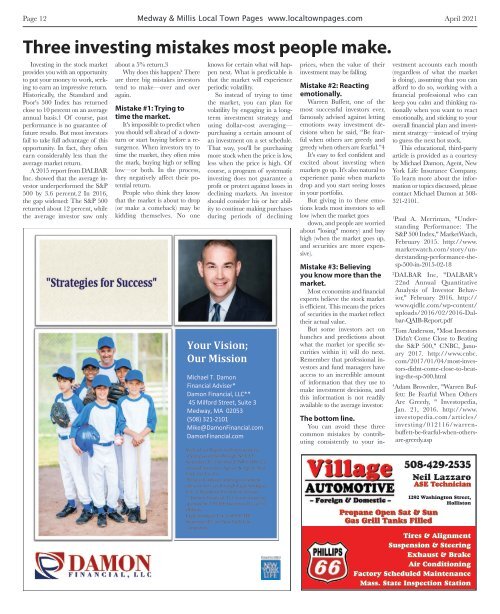Create successful ePaper yourself
Turn your PDF publications into a flip-book with our unique Google optimized e-Paper software.
Page 12 <strong>Medway</strong> & <strong>Millis</strong> Local Town Pages www.localtownpages.com <strong>April</strong> <strong>2021</strong><br />
Three investing mistakes most people make.<br />
Investing in the stock market<br />
provides you with an opportunity<br />
to put your money to work, seeking<br />
to earn an impressive return.<br />
Historically, the Standard and<br />
Poor's 500 Index has returned<br />
close to 10 percent on an average<br />
annual basis.1 Of course, past<br />
performance is no guarantee of<br />
future results. But most investors<br />
fail to take full advantage of this<br />
opportunity. In fact, they often<br />
earn considerably less than the<br />
average market return.<br />
A 2015 report from DALBAR<br />
Inc. showed that the average investor<br />
underperformed the S&P<br />
500 by 3.6 percent.2 In 2016,<br />
the gap widened: The S&P 500<br />
returned about 12 percent, while<br />
the average investor saw only<br />
about a 5% return.3<br />
Why does this happen? There<br />
are three big mistakes investors<br />
tend to make—over and over<br />
again.<br />
Mistake #1: Trying to<br />
time the market.<br />
It's impossible to predict when<br />
you should sell ahead of a downturn<br />
or start buying before a resurgence.<br />
When investors try to<br />
time the market, they often miss<br />
the mark, buying high or selling<br />
low—or both. In the process,<br />
they negatively affect their potential<br />
return.<br />
People who think they know<br />
that the market is about to drop<br />
(or make a comeback) may be<br />
kidding themselves. No one<br />
knows for certain what will happen<br />
next. What is predictable is<br />
that the market will experience<br />
periodic volatility.<br />
So instead of trying to time<br />
the market, you can plan for<br />
volatility by engaging in a longterm<br />
investment strategy and<br />
using dollar-cost averaging—<br />
purchasing a certain amount of<br />
an investment on a set schedule.<br />
That way, you'll be purchasing<br />
more stock when the price is low,<br />
less when the price is high. Of<br />
course, a program of systematic<br />
investing does not guarantee a<br />
profit or protect against losses in<br />
declining markets. An investor<br />
should consider his or her ability<br />
to continue making purchases<br />
during periods of declining<br />
Your Your Vision; Vision;<br />
Our Our Mission Mission<br />
Michael Michael T. Damon T. Damon<br />
Financial Financial Adviser* Adviser*<br />
Damon Damon Financial, Financial, LLC** LLC**<br />
45 Milford 45 Milford Street, Street, Suite 3 Suite 3<br />
<strong>Medway</strong>, <strong>Medway</strong>, MA 02053 MA 02053<br />
(508) (508) 321-2101 321-2101<br />
Mike@DamonFinancial.com<br />
DamonFinancial.com<br />
Michael Michael is a Registered a Registered Representative Representative<br />
offering offering securities securities through through NYLIFE NYLIFE<br />
Securities Securities LLC (member LLC (member FINRA/SIPC), FINRA/SIPC), A A<br />
licensed licensed Insurance Insurance Agency Agency & Agent, & New Agent, New<br />
York Life York Ins. Life Co. Ins. Co.<br />
*Financial *Financial Adviser Adviser offering offering investment investment<br />
advisory<br />
advisory<br />
Services<br />
Services<br />
through<br />
through<br />
Eagle Strategies<br />
Eagle Strategies<br />
LLC, a Registered<br />
LLC, a Registered<br />
Investment<br />
Investment<br />
Adviser.<br />
Adviser.<br />
** Damon<br />
** Damon<br />
Financial,<br />
Financial,<br />
LLC is not<br />
LLC<br />
owned<br />
is not<br />
or<br />
owned or<br />
operated<br />
operated<br />
by NYLIFE<br />
by NYLIFE<br />
Securities<br />
Securities<br />
LLC or its<br />
LLC or its<br />
affiliates.<br />
affiliates.<br />
Eagle Strategies LLC and NYLIFE<br />
Eagle Strategies LLC and NYLIFE<br />
Securities LLC are New York Life<br />
Securities LLC are New York Life<br />
Companies.<br />
Companies.<br />
prices, when the value of their<br />
investment may be falling.<br />
Mistake #2: Reacting<br />
emotionally.<br />
Warren Buffett, one of the<br />
most successful investors ever,<br />
famously advised against letting<br />
emotions sway investment decisions<br />
when he said, “Be fearful<br />
when others are greedy and<br />
greedy when others are fearful.”4<br />
It's easy to feel confident and<br />
excited about investing when<br />
markets go up. It's also natural to<br />
experience panic when markets<br />
drop and you start seeing losses<br />
in your portfolio.<br />
But giving in to these emotions<br />
leads most investors to sell<br />
low (when the market goes<br />
down, and people are worried<br />
about "losing" money) and buy<br />
high (when the market goes up,<br />
and securities are more expensive).<br />
Mistake #3: Believing<br />
you know more than the<br />
market.<br />
Most economists and financial<br />
experts believe the stock market<br />
is efficient. This means the prices<br />
of securities in the market reflect<br />
their actual value.<br />
But some investors act on<br />
hunches and predictions about<br />
what the market (or specific securities<br />
within it) will do next.<br />
Remember that professional investors<br />
and fund managers have<br />
access to an incredible amount<br />
of information that they use to<br />
make investment decisions, and<br />
this information is not readily<br />
available to the average investor.<br />
The bottom line.<br />
You can avoid these three<br />
common mistakes by contributing<br />
consistently to your investment<br />
accounts each month<br />
(regardless of what the market<br />
is doing), assuming that you can<br />
afford to do so, working with a<br />
financial professional who can<br />
keep you calm and thinking rationally<br />
when you want to react<br />
emotionally, and sticking to your<br />
overall financial plan and investment<br />
strategy—instead of trying<br />
to guess the next hot stock.<br />
This educational, third-party<br />
article is provided as a courtesy<br />
by Michael Damon, Agent, New<br />
York Life Insurance Company.<br />
To learn more about the information<br />
or topics discussed, please<br />
contact Michael Damon at 508-<br />
321-2101.<br />
1<br />
Paul A. Merriman, "Understanding<br />
Performance: The<br />
S&P 500 Index," MarketWatch,<br />
February 2015. http://www.<br />
marketwatch.com/story/understanding-performance-thesp-500-in-2015-02-18<br />
2<br />
DALBAR Inc, "DALBAR's<br />
22nd Annual Quantitative<br />
Analysis of Investor Behavior,"<br />
February 2016. http://<br />
www.qidllc.com/wp-content/<br />
uploads/2016/02/2016-Dalbar-QAIB-Report.pdf<br />
3<br />
Tom Anderson, "Most Investors<br />
Didn't Come Close to Beating<br />
the S&P 500," CNBC, January<br />
2017. http://www.cnbc.<br />
com/2017/01/04/most-investors-didnt-come-close-to-beating-the-sp-500.html<br />
4<br />
Adam Brownlee, "Warren Buffett:<br />
Be Fearful When Others<br />
Are Greedy, " Investopedia,<br />
Jan. 21, 2016. http://www.<br />
investopedia.com/articles/<br />
investing/012116/warrenbuffett-be-fearful-when-othersare-greedy.asp<br />
508-429-2535<br />
Propane Open Sat & Sun<br />
Gas Grill Tanks Filled<br />
Neil Lazzaro<br />
ASE Technician<br />
1292 Washington Street,<br />
Holliston<br />
Tires & Alignment<br />
Suspension & Steering<br />
Exhaust & Brake<br />
Air Conditioning<br />
Factory Scheduled Maintenance<br />
Mass. State Inspection Station

















